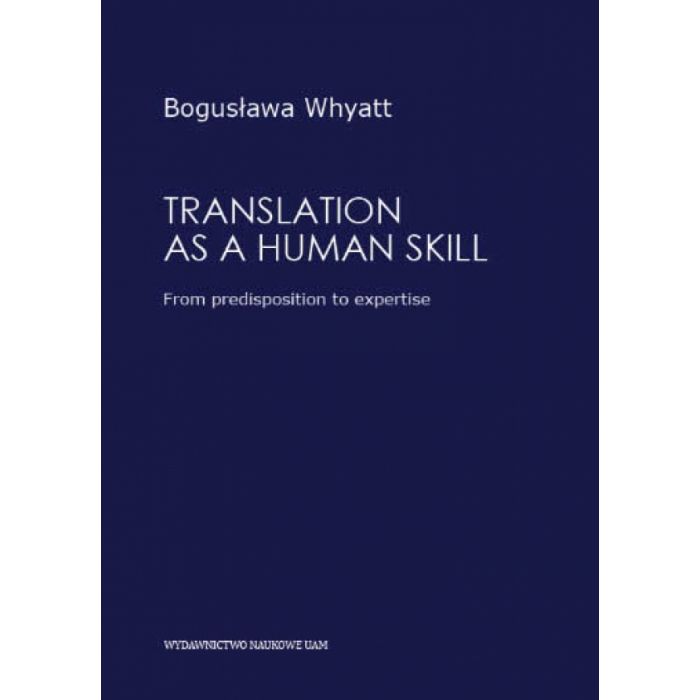Translation as a human skill. From predisposition to expertise
- In Stock: in stock
- ISBN: 978- 83-232-2504-1
- Category: OUTLET, English Philology
- Year of publication: 2012
Książka podejmuje tematykę przekładu jako umiejętności człowieka w perspektywie rozwojowej od predyspozycji po kompetencje eksperta. Zakładając, że umysł ludzki z natury jest umysłem przekładającym sens, wszyscy znający dwa języki są w stanie tłumaczyć, ale tylko niektórzy rozwijają tą zdolność w bardziej złożoną umiejętność, jeszcze mniej osób zdobywa zawodowe kompetencje, a już nieliczni stają się ekspertami. Rozpoczynając od dokładnej analizy podstaw jakie daje znajomość dwóch języków, autorka dokonuje przeglądu wiedzy dotyczącej tłumaczenia jako zdolności naturalnej i umiejętności wyuczonej, czego rezultatem jest wysunięcie hipotezy, iż rozwój kompetencji tłumaczeniowych można postrzegać jako proces integracji wiedzy. Naturalni tłumacze integrują tylko wiedzę językową podczas gdy tłumacze zawodowi integrują wszystkie przydatne struktury wiedzy. Założenia teoretyczne poddane są badaniom empirycznym za pomocą baterii ankiet i programu komputerowego „Translog” , który pozwala na analizę procesu tłumaczenia bez ingerencji w naturalne środowisko pracy tłumacza. Konkluzje i praktyczne przesłanki w intencji autorki przyczynią się do wzrostu świadomości rozwojowej natury tłumaczenia jako umiejętności człowieka i tym samym podważą powszechne mylne poglądy.
The book explores translation as a human skill in its evolutionary perspective from the predisposition to translate to translation expertise. By assuming that the human mind is
intrinsically a translating mind all people who know two languages are able to translate but only some develop their natural ability into a more refined skill, fewer choose to acquire translation competence, and few attain the level of expertise. Starting with a thorough analysis of the bilingual foundations on which translation as a human skill is built the natural ability is analyzed and followed by an up-to-date account of translation as a trained skill with the underlying translation competence. To account for the developmental nature of translation as a skill a suggestion is made that the acquisition of translation expertise can be seen as a process of learning to integrate
knowledge for the purpose of translating. While natural translators integrate only their bilingual knowledge professional translators build a Knowledge Integration Network (KIN) in which all the knowledge relevant for a task at hand is integrated and ready for use. The theoretical assumptions are put to an empirical test with research tools including a battery of questionnaires and Translog, a computer software program which allows to analyze the translation process without compromising its ecological validity. The subjects include translators at various stages on the developmental continuum. It is hoped that the conclusions and implications will raise awareness of the developmental nature of translation as a human skill, and thus challenge the common misconceptions.
| Detailed information | |
|---|---|
| Contents |
Download file

|
|
|
|
| Publication Version | printed |
| Format | 17,0 x 24,0 |
| Title (EN) | Tłumaczenie jako umiejętność człowieka. Od predyspozycji do poziomu eksperta |
| Type of publication | Monografia |
| Edition | I |
| Series | Filologia Angielska nr 38 |
| ISSN | 0554-8144 |
| ISBN | 978- 83-232-2504-1 |
| Number of pages | 448 |
| Number of publishing sheets | 28,00 |
| Type of binding | paperback |
